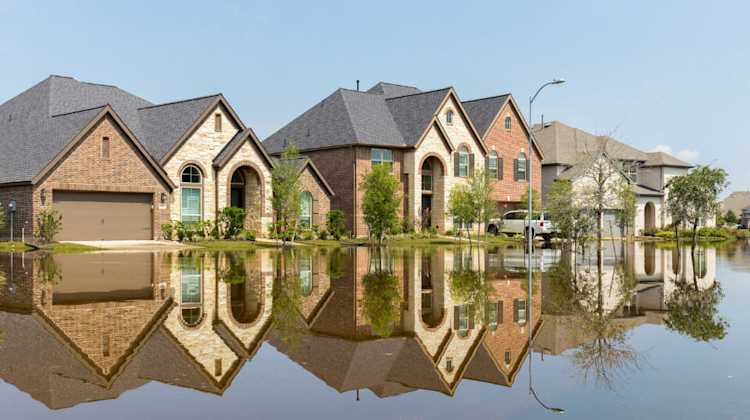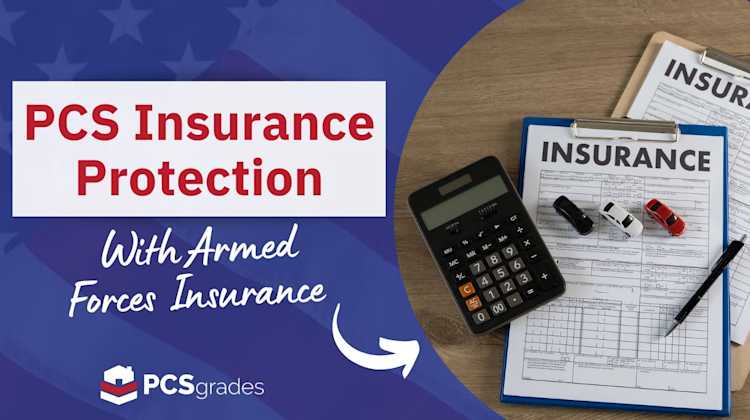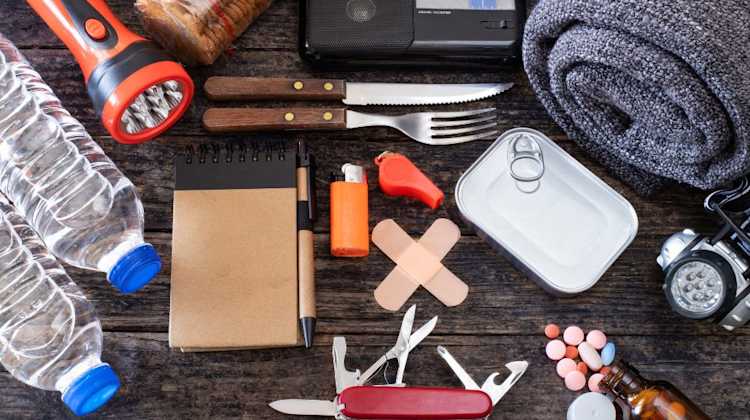Webinar: Disaster Preparedness
by Lizann Lightfoot - August 5th, 2022
How should you prepare for floods at your duty station?
First, you need to know if you are in a flood zone. You can find those maps online through the county or city. You want to know that, because people are evacuated based on the zone. Flood damage is so expensive, and flood insurance is not something that is automatically part of your policy. You need to add flood insurance to your policy if you are in a flood or hurricane area, and it takes 30 days to take effect.
Floods often happen in the middle of the night, so it’s important to keep things up off the floor. A fire-safe box will keep things safe, and you should keep important mementos up on a shelf. Water is damaging, so keep everything up high if possible, and be prepared to evacuate whenever they tell you to.
How do you prepare for hurricanes near your military base?
Over the past few years, modern technology can predict these storms days in advance, sometimes a week out. The number one tip (which applies to all natural disasters) is that you need to find a reliable source of information. There are plenty of amateurs and popular weather pages, but you want to look at local news sources, and NOAA (National Oceanic and Atmospheric Association) pages to get updates.
Hurricane damage comes from both rain (water) and the winds. You need to secure outdoor items and move them into a garage or tie them down. Indoors, move things away from windows, and find a protected spot inside.
Do you need hurricane shutters? Maybe. Talk to your neighbors, people who have lived in your community for a while. If they are putting plywood over the windows, then you should too. Ask them when they start to be concerned, because that’s when you need to be concerned.
What should we do in the event of a tornado?
Well, don’t stand on the front porch and look at it! There are already storm chasers, we don’t need to be those people. It’s important to tune into your local news and weather stations, because there isn’t much warning for tornados. You may hear the “giant voice” if you live on a military base, or hear tornado sirens go off in town if you are close enough, but you need to know when it’s a higher possibility. Your smart phone will alert you to this. You can prepare by securing things outside, and for having a plan both for when you are at home and when you’re NOT at home.
If you are out driving when a tornado is nearby, you want to stop and take shelter--maybe in a ditch. You don’t want to be caught up in debris. You definitely do not want to drive closer to the tornados. You want to be low to the ground and get into a shelter if you can.
Tornado warnings are only 4 to 9 minutes in advance. What do you do in that time?
If I’m home with my kids, my priority is to get them somewhere safe--low to the ground, underground if possible. If we aren’t home, I want to get them away from trees, cars, any debris that could hurt you. Try to get somewhere that minimizes your risk of getting hit by something--away from windows, interior room, etc. And that’s why it’s important to have a plan before they hit.
What do I do when there’s an earthquake?
They’re hard to prepare for because you won’t have any warning, unless you live on a fault line and know they are expected. You may have heard it’s important to stand in a doorway: don’t do that! You want to get under something sturdy like a table or desk, protect your head and neck, and be close to the ground near an interior wall.
The misconception (seen in many movies) used to be that a doorway was structurally sound, but things will be moving around, so it’s better to be inside near an interior load-bearing wall. Don’t run outside. You have to wait for the aftershocks and the all-clear before you go outside.
If you are upstairs during an earthquake, don’t run downstairs. Get low to the ground and cover your head and neck.
Not sure what storms to expect at your new military base, or what your insurance will cover? Learn the details of different types of natural disaster insurance here.
Do I need an Emergency Kit?
It really depends on your location and your family’s needs. Do you have any medical concerns or family members that need any extra help or equipment to travel? It’s great to have a go-bag packed and stored in the car, with clothing and essential supplies, since you may not always be home when disaster strikes. Think about what you would need to “rough it” for your family to survive or drive a few days. You will need to make a habit of buying canned fruits and vegetables, protein bars, or shelf-stable food that would feed everyone for a few days if needed.
How do we prepare kids for emergencies or disasters?
It’s important that we talk to our kids in an age-appropriate way about many things, including this. By the time they are going to school, they are practicing fire drills. So you can go over these things with them. Practice teaching them how to call 911, and make sure they know your address. Make sure they know where to go or where to meet up. Growing up, we had fire drills and practiced in our own house (daughter of a fireman, haha). If you only have a few minutes, you need to already know what to do, because there’s no time to think.
So have a plan and practice it with them. Talk through the importance of watching the news and listening to the weather radio. Tell them there is a storm coming, and what you will do before it hits or when it comes, especially if it is in the middle of the night. You can say, “This concerns me too,” but here is our plan.
We have great tips to prepare your family for an emergency in this article here.
Do you need to have an Evacuation Plan?
You need to have a plan for both-- evacuation or sheltering in place. You need to know where you could or should go in the case of an emergency. Military spouses must be able to do this plan on their own, since the service member is sometimes taken away by the military during an emergency event or natural disaster. Make a plan for where you can take your pets. A lot of schools become evacuation centers. If possible, just drive to the house of a friend or family member and get out of the way for the first responders to get in and help people.
Have multiple plans, to get away from storms in different directions. Always err on the side of leaving early. Even if the storm doesn’t hit you, then you get out of the way and don’t have extra stress added to it. The Red Cross has some great plans and resources on their website so you know what to prepare and what to put in your plan.
Sometimes when you check into a military base in a frequent natural disaster zone, the base may ask you to provide an evacuation plan when you check in.
If you’re in a Mandatory Evacuation Zone during a storm, does insurance cover your evacuation?
That’s a difficult question, because the answer is “it depends.” I have heard everything from Yes to No, depending on what happened. There’s always the question of who gets reimbursed. Your property is covered by your insurance--flood, etc. Your travel may not be covered. FEMA may step in, but not always. I usually encourage you to just go and figure out the details later, but I know that isn’t always possible.
What should be part of your Emergency Plan, for yourself or your family?
Look up your specific family needs: medications, babies, pets--take all that into consideration. Look at what you need, then pare it down to what you actually need. Consider all the things that could come at you. Leaving the area in your car is a different situation than sheltering in place. Ask how far you can go, and where you will go for different scenarios. Can you book a hotel room in advance? What is in that area? What people can help you? Can you execute this plan on your own without your spouse?
In my current area, I don’t have a lot of emergency fears. In Arizona, we had fires. You can’t mess around with fire. But that is a different scenario than a hurricane, where you have 4 or 5 days of warning.
At the very minimum, you should have food and water for 3 or 4 days, you should have medication, blankets, batteries, a weather radio, and that type of equipment all packed in your car, ready to go. Take a look at what you need, and have it ready to go. You can keep things in your car during that season!
You need to have a communication plan to figure out where to go and how to meet up with your family members, especially if kids aren’t all at home at the time it happens. You need to know where to go and how to contact each other.
Make a plan, communicate the plan, practice it, and don’t be afraid to change it! Having a plan reassures everyone that you are prepared for whatever will come.
What are your favorite resources for Emergency Preparedness?
FEMA’s website Ready.gov is great, it has everything you need. And the Red Cross has excellent resources and checklists to help you prepare?
If your house is damaged, how does insurance coverage work?
Renters’ Insurance is always important, especially if you live on base. You need enough coverage to replace all the things in your house. This insurance is automatically included in most payments to on-base housing companies, but the coverage limits aren’t always enough for what you need.
Homeowners’ Insurance may be going up in the next few years because it costs more to rebuild your house now. You want to have enough coverage to replace your house. There are many nuances in the insurance world, and different types of insurance like Flood aren’t always included, so if you have specific questions, ask a representative from your company.
Also, make sure you tell them when you move! You need to have your belongings covered at the correct address, in whichever state you are actually dwelling in. So update your records after each move.
RAPID FIRE!
Favorite place to order items for emergency kits?
Amazon!
Are MRE’s good for emergency kits?
I say no, because my kids may not eat them. You can probably do better with snacks and protein bars or canned goods. FYI, the heating element in MRE’s can expire before the food, so if you have these on hand, check periodically to make sure they still work!
Should I have a plan for our pets?
Umm, yes! Check to see what evacuation centers will take pets. Hotels will generally take pets in an emergency, but hotels aren’t always an option. Bring their food and their medication. They will be comforting to you and your kids, and they would be really concerned if left behind.
What radio stations or apps do you recommend in an emergency?
The NOAA Facebook page has regular official updates, so you should look there. Your smart phone will give you alerts, similar to amber alerts, if you are in the area of a disaster. I want to stress that your installation should have an emergency alert system. As a member of the community, you can sign up and get those texts, even when you live off base. The more information, the better. Local radio stations will interrupt their broadcast for major updates. And Alexa will have updates too. Your neighborhood Facebook page is not a reliable source of information!
What if insurance reimbursements fall within a specific zone?
You may be required to turn in receipts for reimbursement. You should always consider evacuating, even if the official reimbursement zone does not quite include your house. If you have a savings account, you are more likely to have this option. Keep in mind that you might not get reimbursed for everything, but make the decision that is best for your family based on the information you have at that time. Leaving early is always smart, because we all remember the images after Katrina, of people trying to evacuate in miles of traffic and running out of gas.
Do you have a favorite disaster prep activity?
I like to watch movies where everything goes wrong, and then critique what they should have done differently! I’m a little bit of a control freak, so I like to control what I can and I just need to know the information. I think through various situations, like if I need to evacuate during vacation, or how to get my kids during a disaster. I make a game out of planning.
Do you have a favorite emergency gadget? How important is it to have a generator?
A generator depends on where you live, how likely you are to get hit, and whether you actually need it. If you live out in the country, it could take weeks to repair the power grid. Do you have someone on oxygen or another medical device that needs constant power? If you can get one and you think you will use it, it’s helpful to have, but it probably isn’t essential.
My favorite gadget is a flashlight with a radio that you can hand-crank whenever you need it. We got it for a wedding present, and it still works!
Rebecca Alwine: Army spouse, mom of 3, lover of emergency planning. My parents met at an EMT class, and many relatives were volunteer firefighters. I worked as a 911 dispatcher, then met my soldier and started traveling the world, where we have experienced most types of natural disasters: we packed out during a hurricane, I gave birth during a wildfire, and have experienced several tornadoes and earthquakes. I discovered my love for Emergency Management during my senior year of college, when Hurricane Katrina tore through the Gulf Coast. I went to grad school, where we called ourselves “Masters of Disaster.” My goal is to share what I have learned with other people.







